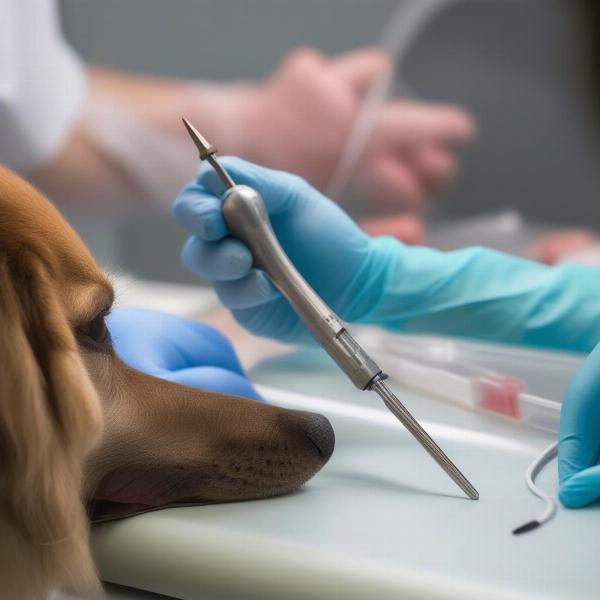Common dog surgeries are a sometimes unavoidable part of pet ownership. While the thought of your furry friend undergoing an operation can be stressful, understanding the common types of procedures, why they’re performed, and what to expect can help ease your concerns. This article will cover frequently performed surgeries in dogs, providing you with the information you need to navigate this aspect of canine care.
Understanding the Need for Dog Surgery
Just like humans, dogs can require surgical intervention for a variety of reasons, ranging from routine procedures like spaying and neutering to more complex operations addressing injuries or illnesses. While prevention is always the best medicine, understanding the potential need for surgery can help you prepare and make informed decisions for your dog’s wellbeing.
Common Types of Dog Surgeries
Several surgical procedures are commonly performed on dogs. Some of the most frequent include:
Spaying and Neutering
These routine procedures prevent unwanted pregnancies and can also reduce the risk of certain health problems. Spaying involves removing the ovaries and uterus of a female dog, while neutering involves removing the testicles of a male dog.
Tumor Removal
 Dog Tumor Removal Surgery
Dog Tumor Removal Surgery
Both benign and cancerous tumors can occur in dogs. Surgical removal is often the best course of action, especially for cancerous tumors.
Dental Procedures
Dental disease is common in dogs and can lead to various health issues. Dental procedures can range from simple cleanings to more complex extractions.
Orthopedic Surgeries
Dogs can experience a range of orthopedic problems, such as torn ligaments (like a cruciate ligament rupture), hip dysplasia, and fractures. Surgery is often necessary to correct these issues and restore mobility.
What to Expect Before, During, and After Surgery
Before any surgical procedure, your veterinarian will conduct a thorough examination and may recommend blood work and other diagnostic tests. During the surgery, your dog will be under general anesthesia. After the surgery, your vet will provide detailed post-operative care instructions, which may include pain management, wound care, and activity restrictions. what is loxicom for dogs Pain management is crucial for a comfortable recovery.
Minimizing Surgical Risks
While no surgery is completely risk-free, you can take steps to minimize potential complications. Ensuring your dog is in good overall health before surgery is crucial. Following your veterinarian’s pre-operative instructions, such as fasting guidelines, is essential. Post-operative care is equally important; adhering to your vet’s recommendations for wound care, medication, and activity restriction will significantly contribute to a successful recovery. nappies on dogs can be helpful in managing hygiene post-surgery.
Questions to Ask Your Veterinarian
It’s important to discuss any concerns you have with your vet before agreeing to surgery. Ask about the procedure itself, potential risks and complications, expected recovery time, and post-operative care. Don’t hesitate to ask for clarification if anything is unclear. soft palate surgery dog can be a complex procedure, so it’s vital to understand the process fully.
Conclusion
Common dog surgeries, while sometimes daunting, are often necessary to maintain your dog’s health and well-being. By understanding the various procedures and what to expect, you can be better prepared to support your furry companion through the process. Open communication with your veterinarian is paramount to ensure the best possible outcome for your dog. dog in trousers may be a cute image, but post-surgical care is a serious matter requiring diligent attention. neo poly dex ophthalmic ointment for dogs is an example of a medication your vet might prescribe post-surgery.
FAQ
- What are the signs my dog needs surgery? Signs can vary depending on the issue but may include changes in behavior, appetite, mobility, or bowel movements.
- How long does it take for a dog to recover from surgery? Recovery time varies depending on the procedure and the individual dog.
- What are the risks of anesthesia for dogs? While generally safe, anesthesia does carry some risks, such as allergic reactions and respiratory problems.
- How can I make my dog comfortable after surgery? Provide a quiet, comfortable resting area, administer pain medication as prescribed, and follow your vet’s instructions for wound care and activity restriction.
- How much does dog surgery cost? The cost varies depending on the procedure, location, and veterinarian.
- What are some common post-operative complications in dogs? Potential complications include infection, bleeding, swelling, and delayed healing.
- When should I call the vet after my dog’s surgery? Contact your vet immediately if you notice any signs of complications, such as excessive bleeding, swelling, lethargy, or loss of appetite.
ILM Dog is your trusted resource for comprehensive information on dog breeds, health, training, nutrition, grooming, and much more. We are dedicated to providing expert advice and practical tips to help you provide the best possible care for your canine companion. From puppy care to senior dog care, we cover all aspects of dog ownership. We also offer insights into products and accessories to enhance your dog’s life. For professional guidance on your dog’s health, training, or any other dog-related query, contact us via email at [email protected] or call us at +44 20-3965-8624. ILM Dog is committed to helping you and your dog live a happy and healthy life together.